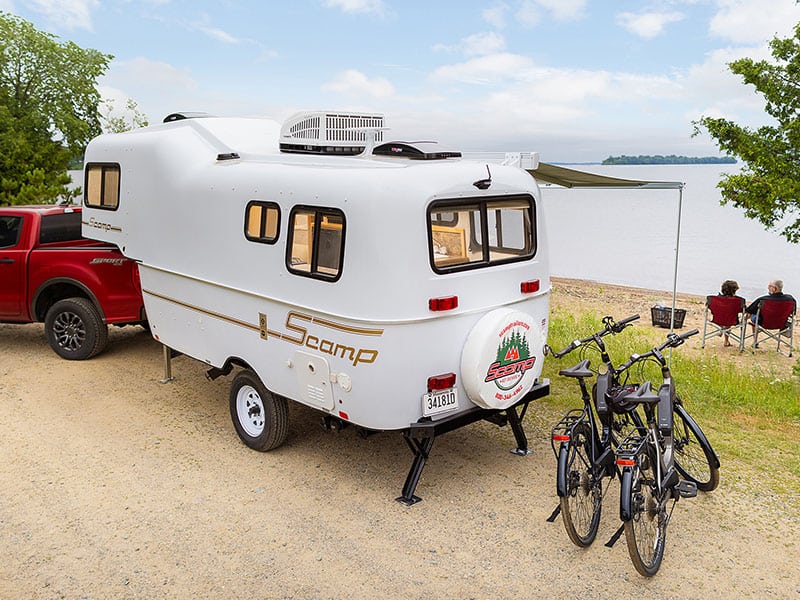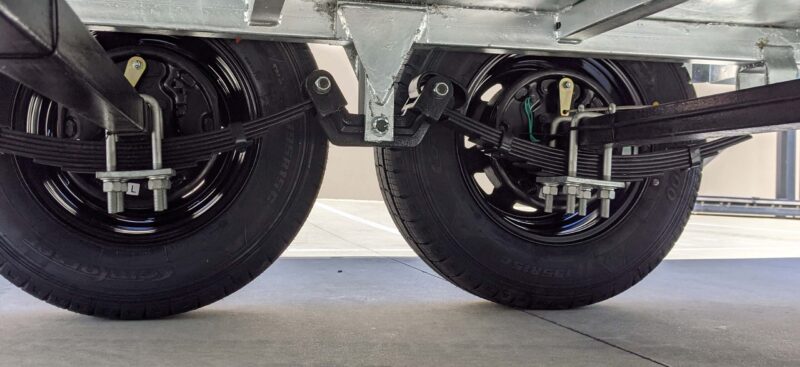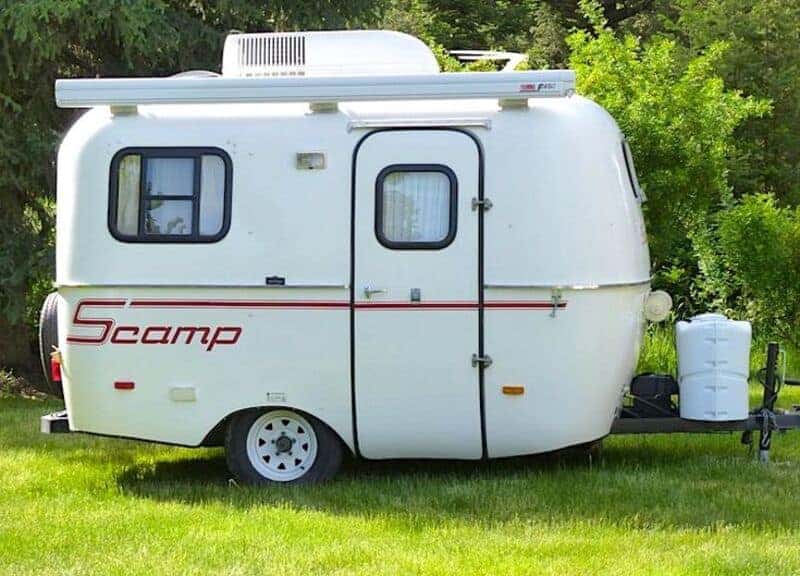We’ve all seen the small, molded fiberglass campers on the road and probably wondered how anyone could manage in such a small space. These campers might not be for everyone, but they are certainly a great option for a lightweight RV that is well-built.
Easy to tow, low maintenance, long-lasting, and great resale value. What more could you want in an RV? Well, they are on the small side and there is a reason for that.
Let’s take a more in-depth look at fiberglass camper trailers and find out why these small trailers are so popular and smaller than traditional camper trailers.
What Is a Molded Fiberglass Camper Trailer?
Made of fiberglass and usually consisting of two pieces fused together, fiberglass trailers are very unique.
Most other campers are framed with wood or aluminum with insulation sandwiched between the layers. Traditionally built campers also have separate walls, roofs, and floors which allow for many potential leak points.
Wooden framed trailers can still have fiberglass exteriors. In a truly molded fiberglass camper, both the interior and exterior surfaces are fiberglass.
Considered very long-lasting due to the fact that there is almost nowhere in that shell that water or the elements can penetrate.
Fiberglass is also a better insulator than metal or wood and will help keep occupants warm or cool with less use of the heating or cooling units. You will also use less electricity or propane to stay comfortable.
Fiberglass campers also have no slides, again removing an area of potential leak points.
How Are Molded Fiberglass Campers Made?
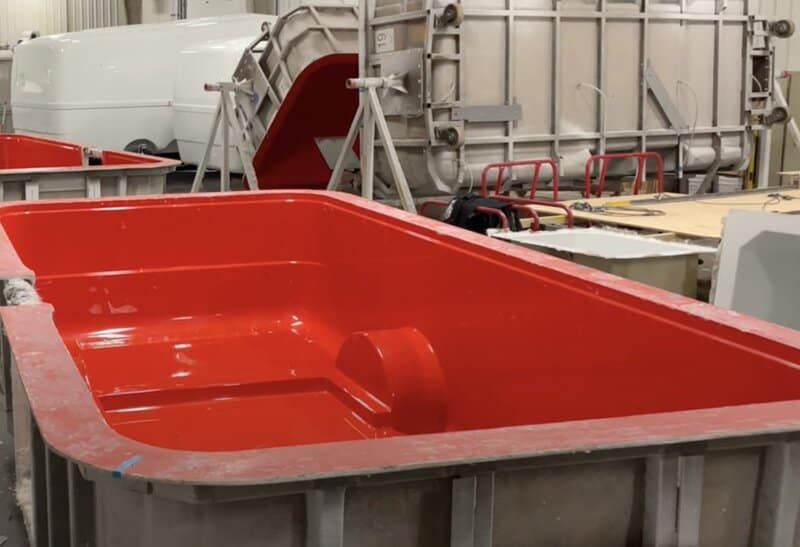
Constructing molded fiberglass campers is a several-step process. Each manufacturer may have a slightly different process but it will look something like this.
1. Prep the Mold
The first step is to choose the base design and the unique mold that accompanies the design. Of course, the mold reflects the size, shape, and type of the finished product.
Unlike other RVs using a mold means the different shapes and sizes are more difficult and costly to produce. Manufacturers of molded fiberglass campers generally only have a small number of mold designs.
Before the process begins, the mold must be cleaned of any dust or debris Any contaminants or flaws in the mold will result in problems in the next steps.
2. Apply the Gel Coat
The white gel coat will be the outermost layer of the trailer’s fiberglass shell. As the gel coat is sprayed into the mold, the thickness is continually checked to ensure it is consistent.
The result will be a durable finish that is non-porous and will hold up to the elements. A gel coat also makes for easy maintenance and repairs. For these reasons, gel coat is also used in marine applications. Harmful UV rays and exposure to wet conditions require a tough exterior coating.
3. Fiberglass Coating
Fiberglass is applied in layers following the gel coat. Combined with a resin, it is also sprayed into the mold with air being rolled out to ensure a strong bond.
During this step, the flexible glass is combined with resin and sprayed into the mold.
This combination forms a strong polymer that will not easily dent, break down, or rot over time. It will flex and maintain its integrity.
4. Combining the top and bottom
After the fiberglass and gel coating is completed, the top and bottom molds are stacked to form a capsule.
Prior to the mold being separated, the seam between the top and bottom molds is sealed together. The result is a completed one-piece shell.
5. Insulation
On the inside, any electrical and plumbing that needs to be run is taken care of. Then a foam layer of insulation is applied. Applying a heavy-coated vinyl is the final step.
The interior and exterior of the shell are complete and ready for the interior and exterior finishes.
Why Are Molded Fiberglass Camper Trailers So Small?
Molded fiberglass camper trailers are small for several reasons. Manufacturers are required to house large molds and reproduce them as needed. This is a pretty big undertaking and commitment considering you can’t roll out new models every year.
Also, these molds are expensive. Most manufacturers would not want to change molds for every new model every year. Right now, the fiberglass market is primarily small trailers so spending the money to develop a large mold is probably not going to be worth the cost.
There are fiberglass campers up to 25 feet in length and even some fifth-wheel models. However, the market is primarily centered around the smaller lightweight models.
Is A Fiberglass Camper Trailer Right For You?
There are many pros and cons of owning a fiberglass camper trailer. As with any class of RV, fiberglass campers aren’t right for some and perfect for others.
Let’s take a look at some of the reasons you may or may not want to invest in this style of travel trailer.
7 Advantages Of Fiberglass Campers
- Much less likely to have leaks
- Because of their fiberglass shells, these campers are lightweight
- Easily towed by a variety of vehicles
- Rounded corners and edges can give fiberglass campers a warm, pleasant feel
- Fiberglass campers are easy to maintain
- These shells last a long time
- They have a good resell value
7 Disadvantages Of Fiberglass Campers
- Most are small at 25 feet or less
- Rounded corners and fiberglass construction make them hard to customize
- Compared to a similar-sized travel trailer fiberglass is more expensive
- Most have wet baths
- Changing a floorplan is difficult
- There are no slideouts
- The small size only makes them suitable for a couple or single traveler
How Much Are Fiberglass Campers?
Molded fiberglass campers can range anywhere from $15,000 to $75,000. The majority of the popular models are going to fall into the $25,000 to $40,000 range.
Before diving into purchasing a fiberglass camper, consider features that are important to you. It is also important to know that you get what you pay for with a fiberglass camper.
Fiberglass construction is time-consuming and labor-intensive. A very small amount of RV manufacturers make fiberglass travel trailers.
Who Makes Molded Fiberglass Campers?
Several manufacturers build fiberglass campers. Certainly not as many as your traditional RVs
Any of these manufacturers can offer a high-quality travel trailer that will last many years. Although this isn’t all the manufacturers producing fiberglass campers they are some of the most popular.
Escape Trailers
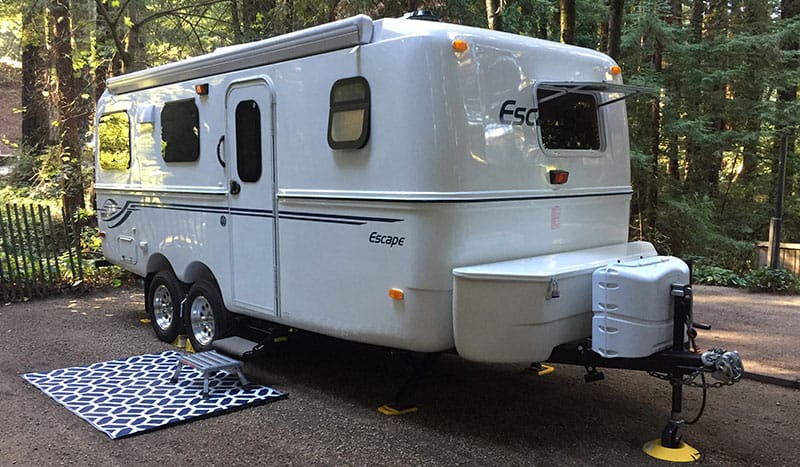
Escape Trailers is certainly a familiar name for fiberglass campers. Produced in Canada, Escape touts its high-quality construction, lightweight design, and classic look.
These are the ultimate in customizable trailers with the customer given a lot of freedom to make adjustments. There are 6 models and 10 different floor plans, including fifth wheels or trailers with large kitchens and a full or wet bath.
Escape trailers come in lengths of up to 21 feet and can generally be towed by SUVs and mid-size vans.
Scamp Trailers
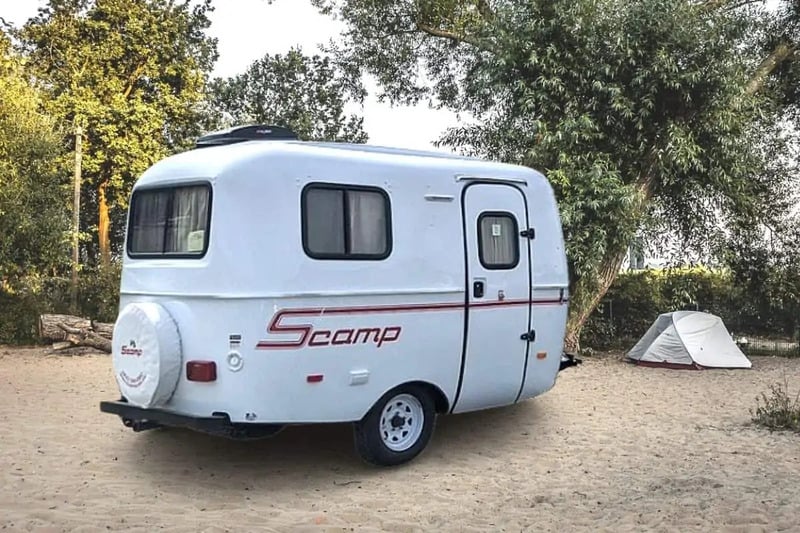
Based in Backus, Minnesota, Scamp is a manufacturer that produces small fiberglass campers that are durable, lightweight, and high-quality.
Scamp trailers built in the early 1970s are still in use today. Know for their lightweight Scamp is also the maker of the smallest travel trailer with a bathroom. The Scamp 13′ takes that honor proudly.
Scamp trailers can be purchased with a range of features, including a wet bath and kitchen with a two-burner stove. They can also be outfitted with an awning, furnace, hardwood interior, and air conditioning.
Models come in standard and deluxe trailers and deluxe fifth wheel and are up to 19 feet in length (fifth wheel).
Bigfoot RV
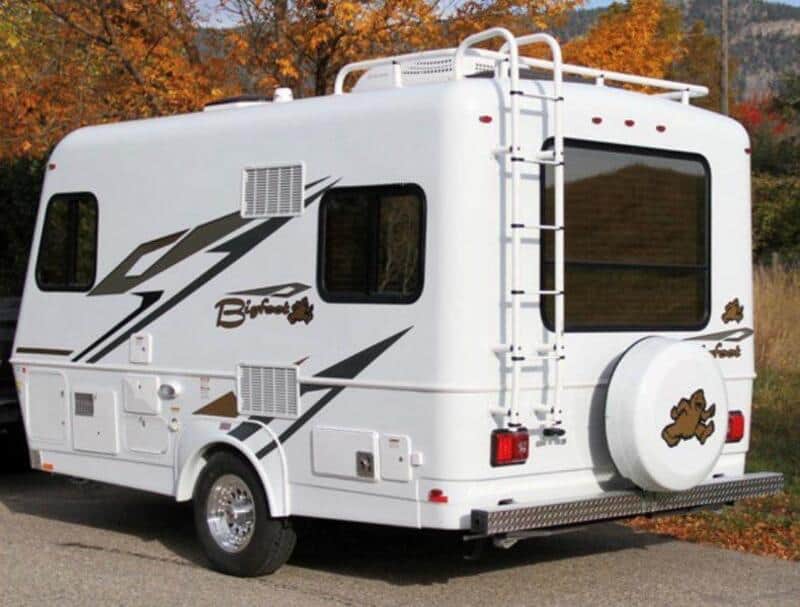
Bigfoot RVs has been doing business for over 30 years, providing truck campers and travel trailers from their facility in Armstrong, BC, Canada. Canada loves its fiberglass campers!
The company touts a well-insulated product that is considered usable year-round, in all types of weather. It also manufactures trailers that come in longer floorplans, up to 25 feet, and are some of the bigger fiberglass options available.
Some of the campers feature a full bathroom, instead of a wet bath, and a larger kitchen space.
Built to withstand Canadian cold weather, you know you’re getting a well-designed and built fiberglass camper.
Oliver Travel Trailers
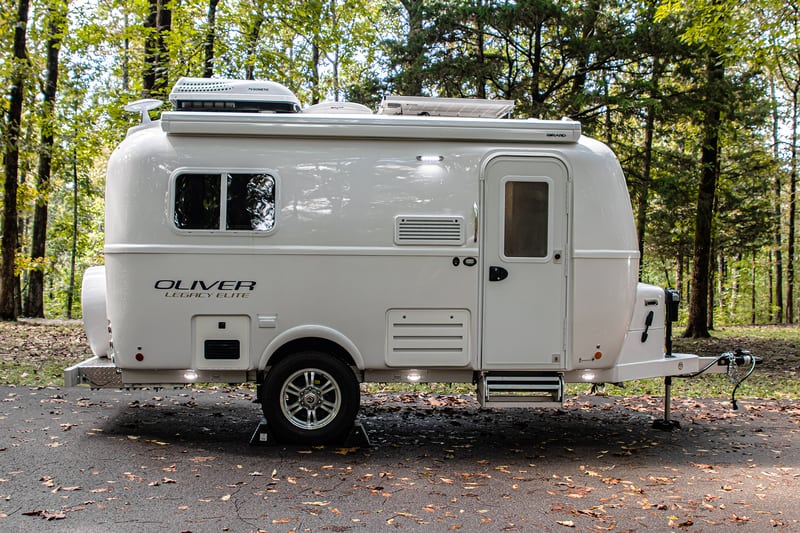
Built to your specifications and of the highest quality. That’s Oliver Travel Trailers‘ promise. Their double-hull fiberglass shells combined with aluminum chassis result in a trailer to last a lifetime.
They have both single and tandem-axle versions and feature a range of amenities and features, including enclosed plumbing and water tanks with heat, a unique double-shelled fiberglass and composite hull, and options for solar panels.
These trailers are built for 4-season camping and come in lengths up to 23.6 feet. Seen as the Airstream of fiberglass campers, Oliver campers aren’t cheap but as with Airstream, you’re getting something special.
Casita Travel Trailers
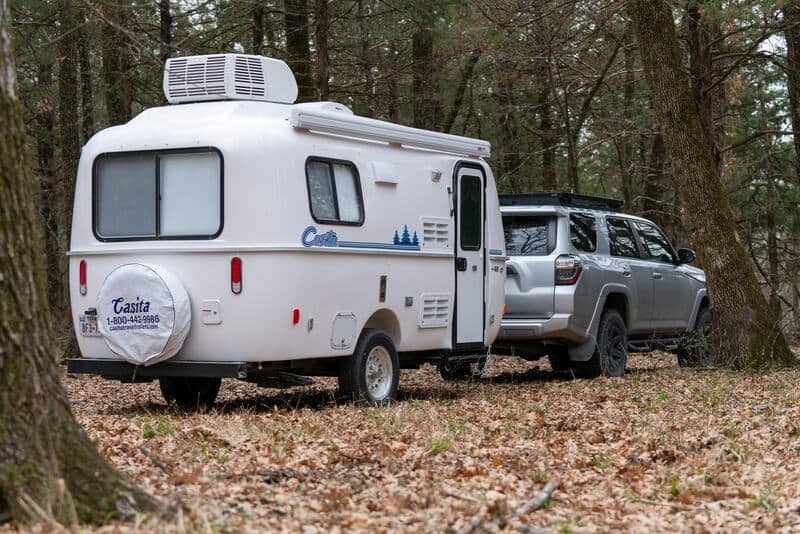
With more than 35 years in business, Casita Travel Trailers is a family-owned manufacturer of fiberglass campers. Based in Rice, Texas, they produce lightweight campers that are simple and practical.
They offer a range of customization options including a wet bath in some models and some that can sleep up to five.
Larger models are 17 feet long and still manage a dry weight under 2500 lbs! These larger models offer sleeping for up to 6 making them comfortable for most families.
Final Thoughts About Molded Fiberglass Camper Trailers
Fiberglass camper trailers are a great option to have for an RV, particularly one that you want to keep for a long time that will hold its value.
They are generally impervious to water damage and fiberglass is easy to repair and maintain. However, they don’t come in models that are more than 25 feet so you might have to sacrifice some living space. Price can also be a deterrent for purchasing these small campers.
However, one of the main advantages of using fiberglass is its lightweight properties. Fiberglass makes it much lighter, making it easier to transport and maneuver, improving fuel efficiency, and making it easy to tow with a smaller vehicle.
Will you consider a fiberglass trailer for your next RV?
Related Reading:
– Are Fiberglass Campers Better Than Aluminum
– 10 Best Fiberglass Travel Trailer Brands
– Is It Worth Restoring A Vintage Camper?
– 10 Best DIY Teardrop Camper Build Kits
About the Author:
Terri Nighswonger and her husband Todd have been RVing and work camping for five years with their Cavalier King Charles Spaniel, Newton, and their Minnie Australian Shepherd, Remi.
They originate from the Midwest but plan to enjoy the West for a few years, wintering in Arizona and summering wherever the road may lead. Writing is Terri’s passion, but she also loves hiking, kayaking, walking her dogs, and anything she can do outdoors.


